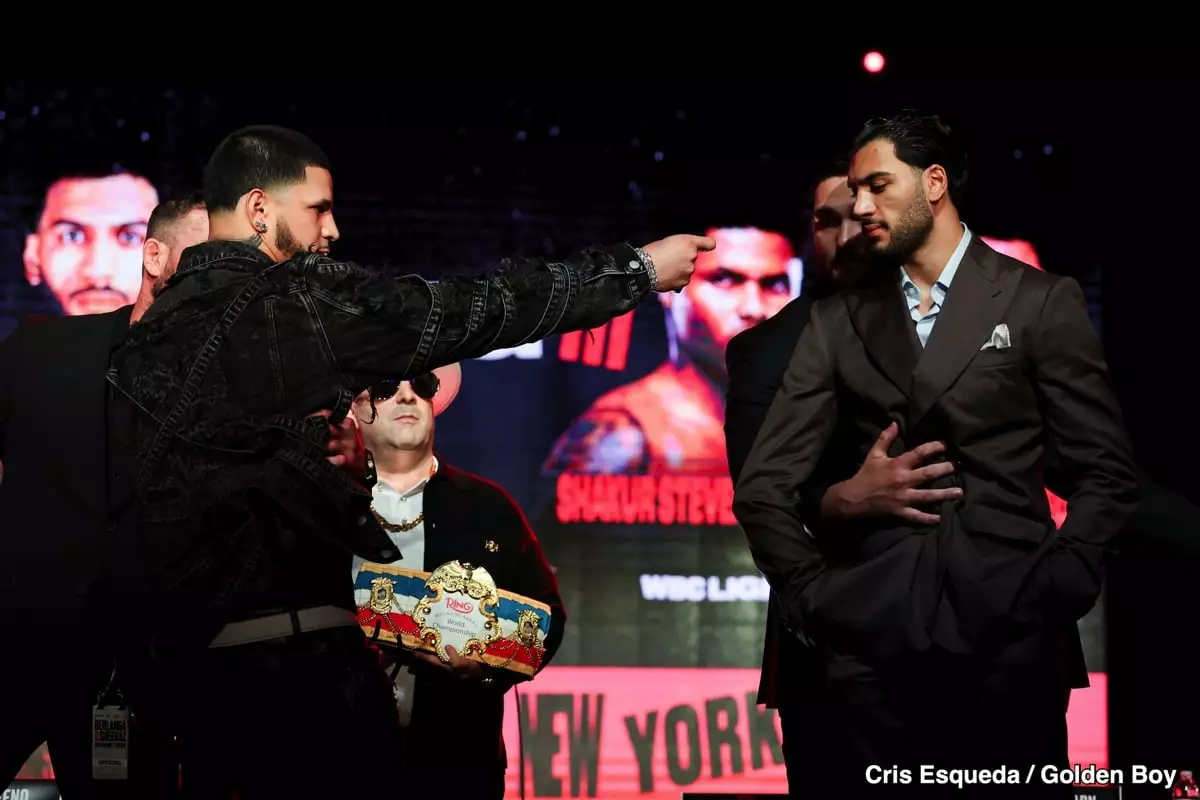Edgar Berlanga’s recent statements reveal a fighter brimming with confidence, bordering on psychological warfare. Announcing that he has “already beat” Hamzah Sheeraz mentally, Berlanga views the upcoming July 12th bout in Queens as more than just a contest—it’s a stepping stone toward a bigger prize: an eventual showdown with Canelo Alvarez. Berlanga’s readiness to elevate Sheeraz to the status of Canelo mentally is an intriguing, if risky, move. By picturing Sheeraz as his ultimate challenge, Berlanga aims to sharpen his focus and perhaps unsettle his opponent. While psychological tactics have long been a staple in boxing, Berlanga’s approach underscores an inflated self-assuredness that may either fuel his performance or set him up for a harsh reality check.
A Challenging Reality Behind Berlanga’s Rise
Yet, beneath the bravado lies a more sobering narrative. Berlanga’s record, impressive at first glance, masks a career carefully managed to enhance his image rather than truly test his mettle. The path to his current position has been paved predominantly with less challenging opponents—“tomato cans” in boxing parlance—courtesy of Top Rank promotions. This methodical padding is a familiar tactic in boxing, aiming to build hype and an unblemished record rather than develop genuine resilience. When Berlanga faced stiffer competition, such as in his bouts against Jason Quigley and Padraig McCrory, cracks appeared. More notably, his performance against Canelo highlighted glaring shortcomings, undermining the hype surrounding his talent.
The Controversy of a Premature Title Shot
Berlanga’s recent push for a title shot—especially a potential immediate rematch with Canelo—strains credibility within the boxing community. Many fans and analysts argue that Berlanga has simply not earned this opportunity. The sport craves progression and fresh contenders who have demonstrated consistent superiority, not fighters fast-tracked through strategic matchmaking. The perception that Berlanga has been fast-tracked is reinforced by the mismatch narrative; he leapt from bouts with questionable opponents to facing a proven elite like Canelo, with the subsequent fight not inspiring confidence in his readiness. This disconnect fuels skepticism about the legitimacy of his claims and ambitions.
Hamzah Sheeraz: The Overlooked Contender?
Meanwhile, Hamzah Sheeraz’s position in this narrative is complicated. Despite entering the fight undefeated, Sheeraz has been criticized for benefiting from a controversial draw against Carlos Adames. This blemish casts doubt on how deserving he is of a high-profile fight, yet Berlanga portrays him as an obstacle to greatness. Sheeraz’s camp reportedly feels pressure to accept the New York fight, allegedly motivated by the promise of a future Canelo bout, making the dynamics more layered with external forces influencing the matchup. Sheeraz seems caught between wanting to prove himself and navigating matchmaking politics, a struggle familiar to many in the sport.
Boxing’s Demand for Authenticity and Merit
The saga involving Berlanga and Sheeraz exemplifies a larger boxing quandary: balancing entertainment value with genuine competition. Fans grow weary of promotional hype overshadowing merit-based matchups. The boxing community desires fighters who have earned their spot at the top through relentless performances, not through marketing narratives or questionable matchmaking. Berlanga’s insistence on mentally having defeated Sheeraz may serve as motivation, but it also spotlights the potential discord between self-perception and the sport’s harsh realities. If Berlanga approaches the fight with the same tactical naivety he exhibited previously, it would not only harm his career but serve as a cautionary tale about the pitfalls of unchecked confidence.
What Should Define the Next Challenger?
Rather than Berlanga or Sheeraz, there are several middleweights who arguably merit consideration for big fights, especially against elite champions like Canelo. Fighters such as Christian Mbilli, Osleys Iglesias, Lester Martinez, Janibek Alimkhanuly, and Yoenli Hernandez have shown consistent skill and deserve opportunities before matchmaking politics upend the natural order. The boxing ecosystem thrives when meritocracy guides title shots, ensuring competitors have proven their worth both in and out of the ring. Elevating fighters prematurely, based on promotional interests rather than performance, risks eroding the integrity and excitement of the sport.
—
In the end, Edgar Berlanga’s mental strategy and self-assurance may energize him, but boxing is ultimately decided by physical execution, strategy, and resilience under pressure. Berlanga stands at a crossroads—whether he steps up to genuinely challenge himself or continues to inhabit a constructed illusion of readiness will define not only his future but also the sport’s credibility.

